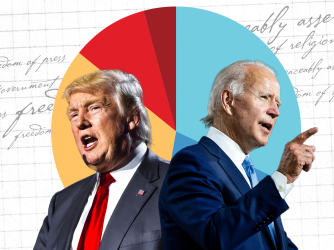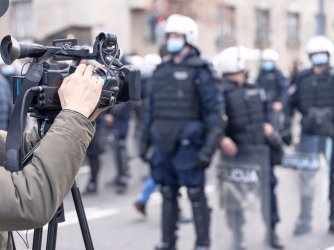Table of Contents
West Virginia University attempts to claim sanctions are not sanctions and disciplinary proceedings are not disciplinary proceedings

West Virginia University Dean of Students G. Corey Farris responded on Dec. 21 to a FIRE letter, which called on the university to rescind sanctions placed on five WVU fraternities without due process.
The sanctions — ranging from mandatory educational programs to loss of official university recognition — were a result of the “Reaching the Summit” initiative, a system-wide program that re-punished Greek organizations for previously adjudicated issues, or issues that had not been adjudicated at all. When students expressed concern, a WVU administrator insisted to students, falsely, that “student organizations do not have due process rights.”
Farris claimed that FIRE misunderstood the facts of this case, but his letter shows that the only misunderstanding is WVU’s willful blindness to basic due process rights.
On Jan. 16, FIRE again wrote to WVU to reiterate our initial concerns and inform WVU of rudimentary constitutional rights and fundamental fairness. The letter demanded that WVU relieve the five fraternities of the sanctions and ensure that it will uphold constitutional due process protections in the future.
The central claim of Farris’s response is that the initiative was somehow not a disciplinary process, but rather a “recognition review process separate and apart from any student conduct process.” This claim, which mirrors what another WVU official told The College Fix, shows either pitiful ignorance about what constitutes a conduct hearing or a deliberate willingness to mischaracterize the outcomes of Reaching the Summit to excuse administrators’ willful violations of student rights. In either case, a simple review of the facts demonstrates why Farris’s claim is wrong.
When WVU announced the Reaching the Summit initiative, it charged a working group with the task of, among other things, reviewing the “judicial history of all chapters.” The working group did just that (as noted in its final report and in WVU’s student newspaper) and issued “recommendations” for each fraternity, ranging from mandatory educational programming and social event restrictions, to loss of recognition. What the initiative calls recommendations are exactly the same as what WVU’s Student Conduct Code calls “Sanctions Applicable to Student Organizations.”
How a process that issues sanctions based on judicial incidents is not “disciplinary” is incomprehensible. WVU's position appears to be that relabeling sanctions as mandatory recommendations means they are not disciplinary. But make no mistake: these are consequences that the university describes as "sanctions" when it's being honest. The only missing element of a disciplinary process in Reaching the Summit was due process.
Farris goes on to claim that FIRE was also incorrect to suggest there was a lack of notice and hearings in Reaching the Summit. He notes: “All fraternity and sorority organizations had adequate notice of the recommendations” and “each organization then had the opportunity to be heard through the appeals process.” In other words, Farris claims that groups were given proper notice because they were notified of sanctions after they had been issued, and the groups had adequate opportunity to be heard because they could appeal the sanctions.
Witness the sleight of hand: students supposedly have due process because they can argue their innocence after being found responsible. While one might assume the administrators of a large public university — which is bound by the Constitution — would understand the basic principles underlying due process, WVU’s letter shows that they apparently do not. Thus, FIRE made sure our response explained due process in the simplest terms possible:
It would be a mockery of due process if those facing deprivations of their rights were first told of their transgressions after receiving the penalty. Under your logic, it would be no issue at all to imprison individuals prior to telling them what crimes they committed, or expect individuals to pay fines before informing them of their infraction.
The end of Farris’s response letter attempts to assure FIRE that WVU does protect the due process rights of student organizations, and he points to the Student Conduct Code, which promises groups notice of allegations in writing and the opportunity to be heard prior to the issuance of sanctions. It is puzzling that Farris includes this point because FIRE’s original letter argued that Reaching the Summit explicitly ignored this promise. A policy only serves its purpose if it’s followed.
And finally, WVU’s response tries to excuse Director of Fraternity and Sorority Life Matthew Richardson, who, in front of a meeting of student leaders, falsely proclaimed: “student organizations do not have due process rights; they don’t.” Instead of conceding that Richardson was wrong, WVU’s letter claims that he was trying to explain that “individuals have different due process rights than student organizations” and that he merely “did not convey that understanding.”
Richardson made his understanding of due process abundantly clear in that meeting, and WVU’s disingenuous attempt to cover for him speaks volumes about how the institution as a whole appears to feel about such issues. An institution that refuses to recognize when its leaders do not understand fundamental rights has little hope of protecting those rights.
We again call upon WVU to take the first step by recognizing that it violated its students’ rights and rescinding the sanctions imposed by the Reaching the Summit working group.
Recent Articles
FIRE’s award-winning Newsdesk covers the free speech news you need to stay informed.

New FIRE poll: Americans equally skeptical Biden or Trump will protect First Amendment rights


Survey shows: Most Americans are concerned about the future of free speech
